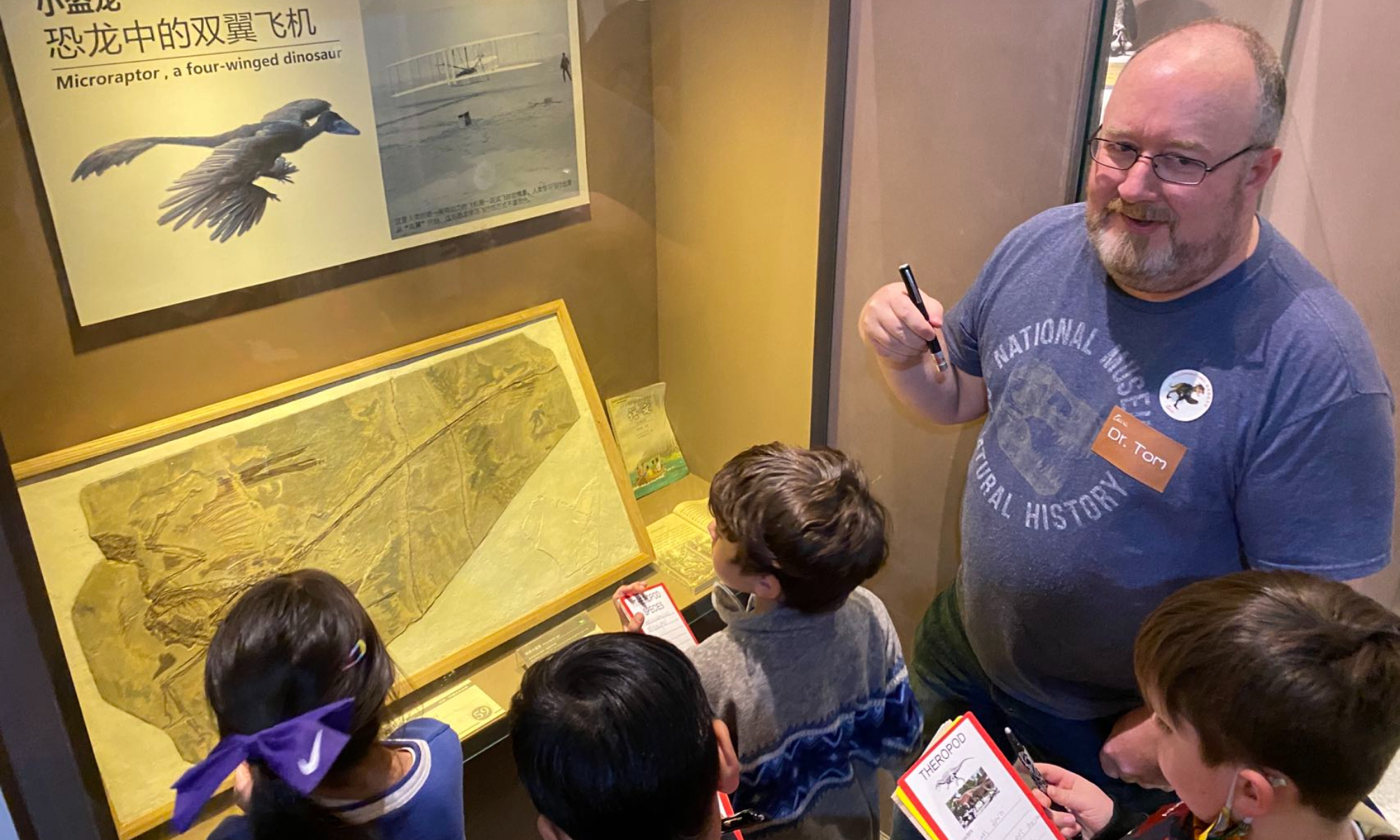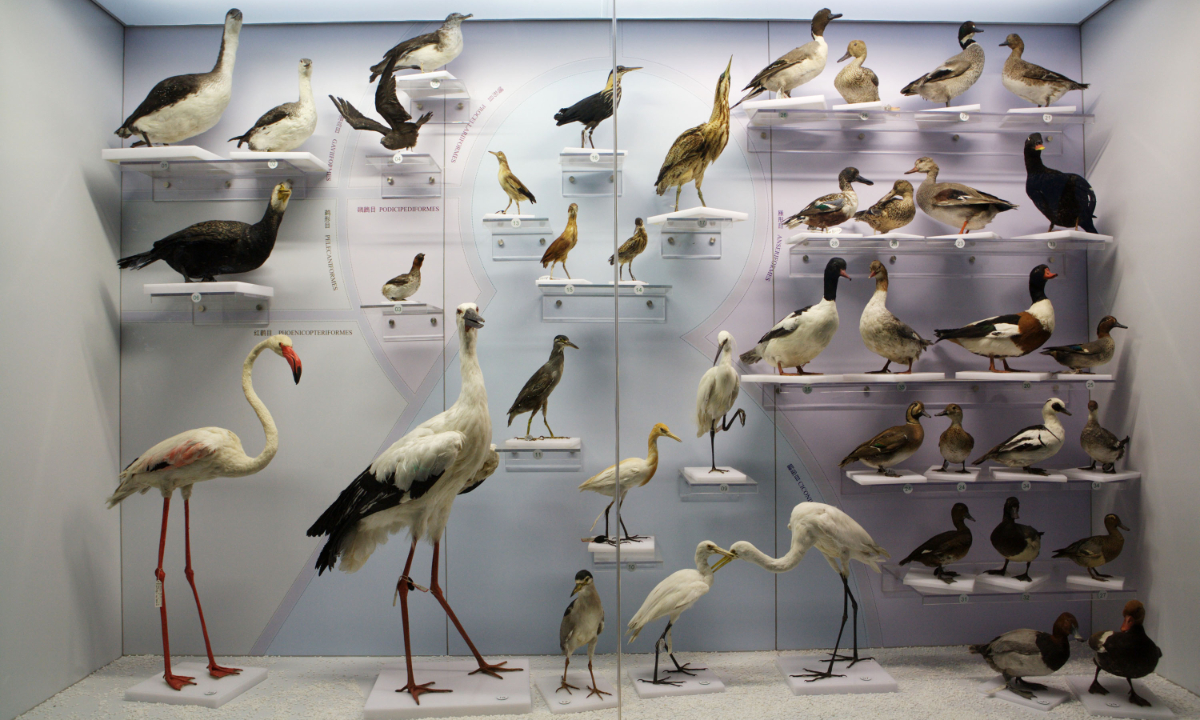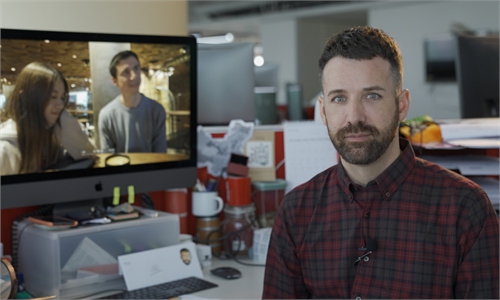Editor's Note:
China's modernization has been an epic journey over the past decades. Under the leadership of the Communist Party of China (CPC), China has become an attractive destination for many foreigners. Many such expats in the country have fulfilled their career aspirations, while some have found love and started families in China.
Why do they choose to live in China? How do expats in China view and interpret China's achievements and persistence measured from various perspectives?
The Global Times interviewed multiple international residents in China from all walks of life, some of whom have made tangible contributions to China's development, to learn about their understanding of the essence of Chinese culture, and gain an insight into how far China has advanced in its pursuit of development and rejuvenation over the last decade.

Dr. Thomas A. Stidham introduces a fossil of Microraptor to children. Photo: Courtesy of Stidham
Having traveled around the globe, US paleontologist Dr.Thomas A. Stidham chose to settle down in Beijing more than a decade ago.
Originally intending to only stay for a year, the fossil expert, who also has become an expert in makingbaozi(meat buns), has now lived contentedly in the country for 11 years, working at what he calls the “world’s best institute” in his field – He is a professor at the Institute of Vertebrate Paleontology and Paleoanthropology (IVPP) in Beijing.
“I’m here to introduce China’s rich natural history discoveries to the West,” he noted.
Enduring legacy
After being invited by IVPP’s then director Zhou Zhonghe in 2011, Dr.Stidham only planned to stay in China as a visiting professor for a year, but he was soon enchanted by the valuable resources that can only be found in China and this made him prolong his stay to today.
“Some of the top people in the world are here; and there are great resources for my work,” Dr. Stidham noted.
He specializes in evolutionand fossil records of living aviary species, which is considered a novel aspect toChinese paleontology.
The Chinese work style of sharing and collaboration on academic resources led the US researcher to come up with some fruitful discoveries.
The fossil of extinct“diving bird” grebe, which has yet to be published as an academic paper, was an original discovery that excited Dr. Stidham and current IVPP director Deng Tao when they took a trip to Yushe county in Shanxi Province.
He told the Global Times thathe plucked the rock whichwrapped aroundthe partially exposed and fragile fossil boneout from the hundreds of kilograms of sediment that was about to be washed through fine screens used to capture small fossils. Given his expertise in birds, he was able to recognize it instantly as the foot bone of a grebe, and his studies since have shown the fossil to be from an unknown species new to science.
The bone is one of the first grebe fossils ever discovered in China. With similar fossils found in Yunnan Province, Dr. Stidham’s research has revealed the early global immigration of the bird group.
“This particular group was actually successful in China for millions of years,”he noted, adding that the closest living relatives to those fossils on the grebe family tree exist today only in North and South America, and not Asia.
The discovery of other treasures such as a fossil skeleton found on theQinghai-Xizang Plateauthat shows owls can also be daytime animals madeDr.Stidham believe China’s “enduring paleontological legacy” as a pathway to engage the public with science.
Under his office building is the Paleozoological Museumof China, where he often hosts science events for the public, especially school children.
Its exhibition hall is home to not only the fossil of Lufengosaurus - discovered in 1941, it is the first dinosaur fossil found in China - but also aT. rex(a dinosaur species called the Tyrannosaurus)display that Dr. Stidham noted can “tell a bigger story” to visitors.
“But the T. rex and some of the other fossils [here] are not from China. When the T. rex lived, there were no nations and no borders. So, evolution is a global story,” he remarked.
Dr. Stidham’s dedication to imbue Chinese children with a global perspective on science has not been in vain. He said he was very proud of a little girl who earned the nickname “Doctor Tom” because once during a museum event she took his name tag and said “I want to be a paleontologist too!”
He has collected a few antique posters from the 1970s and 1980s that depict Chinese school students wearing red scarfs doing experiments in a science lab. Dr. Stidham said he has been amazed by the country’s development and how the scientific spirit has been promoted among younger generations.

Bird specimens in the National Zoological Museum of China in BeijingPhoto: VCG
‘An international science’
Inhissparetime,Dr. Stidham learned how to maketofufrom scratch and also invented his own homemadebaozi. Such activities allow him to “better interact with Chinese culture and society.”
“I also have a secret love of Beibingyang (Literally translated as: Arctic Ocean, the brand name of an orange flavored soda drink from Beijing); it has always been part of my most memorable experiences in Beijing,” he said.
He noted that his postdoctoral mentor Francis Clark Howell, one of the most noted human-evolution scholars in the US, helped him to see how the shared civilization and history of human beings can bring the West and China together.
In 1975, Clark Howell was one of the earliest researchers in the US to be invited to China to study “Peking Man” – one of the earliest homininis found in Asia – discovered at the UNESCO Zhoukoudian site in Beijing’s Fangshan district.
That invitation nearly 50 years ago defines the US’ first joint overseas scientific fossil study with China afterthenpresident Richard Nixon’s visit in 1972, an historical moment that symbolizes the normalization of relations between China and the US.
“Paleontology is an international science,” Dr. Stidham noted.
The US scholar told the Global Times that experiencing the cultural diversity in the country has helped him to grasp a fuller picture about what real life is like here.
“What is generally presented in the media to people is only a tiny part of what China actually is,” he said.
“They will see a headline, but they don’t know about daily life here.”

